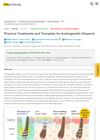44 citations,
September 2016 in “American Journal Of Pathology” Neural crest-derived progenitor cells in the cornea could help treat corneal issues without transplants.
 October 2021 in “Journal of Investigative Dermatology”
October 2021 in “Journal of Investigative Dermatology” COVID-19 infection rates were low in patients with immune diseases, regardless of their treatment type.
 15 citations,
May 2020 in “BMC complementary medicine and therapies”
15 citations,
May 2020 in “BMC complementary medicine and therapies” Polygonum multiflorum extract helps hair grow longer and fights the effects of hormones that cause hair loss.
 January 2019 in “Springer eBooks”
January 2019 in “Springer eBooks” Micrografts are useful for healing wounds, regenerating bone and periodontal tissues, and improving hair transplantation outcomes.
129 citations,
July 2019 in “Stem Cell Research & Therapy” Epidermal stem cells help heal severe skin wounds and have potential for medical treatments.
 29 citations,
March 2021 in “Frontiers in Endocrinology”
29 citations,
March 2021 in “Frontiers in Endocrinology” Testosterone may influence COVID-19 severity and outcomes.
 September 2023 in “Fides et Ratio”
September 2023 in “Fides et Ratio” The safety and effectiveness of gender-affirming treatments for children are uncertain, with potential long-term risks like infertility.
Stem cell treatments show promise for hair loss but need more research.
February 2023 in “Archives of Dermatological Research” A multi-tiered treatment approach is crucial for managing hidradenitis suppurativa in patients with intellectual and developmental disabilities.
December 2022 in “Clinical and experimental dermatology and therapies” Adding the topical gel improved hair growth more than using minoxidil or finasteride alone.
November 2022 in “Journal of Investigative Dermatology” Combining PRP and minoxidil improves hair growth and density in treating hair loss.
 121 citations,
November 2020 in “Endocrine”
121 citations,
November 2020 in “Endocrine” Male hormones like testosterone may make COVID-19 worse, and testing for sensitivity to these hormones could help predict how severe a patient's symptoms might be. Treatments that reduce these hormones are being explored.
1 citations,
January 2022 in “Journal of The American Academy of Dermatology” Direct-to-consumer teledermatology platforms have financial conflicts of interest and lack proper patient care and follow-up.
 28 citations,
September 2013 in “Journal of Investigative Dermatology”
28 citations,
September 2013 in “Journal of Investigative Dermatology” The document concludes that dermal papilla cells are key for hair growth and could be used in new hair loss treatments.
The FDA did not approve a testosterone drug because of safety concerns.
July 2024 in “International Journal of Molecular Sciences” RF-based therapies might help treat hair loss.
7 citations,
December 2015 in “PloS one” Cryopreserved mouse whisker follicles can grow hair when transplanted into nude mice.
 316 citations,
June 2017 in “Stem Cell Research & Therapy”
316 citations,
June 2017 in “Stem Cell Research & Therapy” Fat tissue-derived cells show promise for repairing body tissues, but more research and regulation are needed for safe use.
 November 2023 in “Linköping University medical dissertations”
November 2023 in “Linköping University medical dissertations” Keratinocytes and adipose-derived stem cells can effectively heal difficult skin wounds.
 13 citations,
March 2018 in “Journal of Sociology”
13 citations,
March 2018 in “Journal of Sociology” The anti-ageing treatment market is growing by exploiting fears of ageing with unproven promises, which could harm public trust and genuine science.
Biomimetic dermal papilla spheres can help regenerate hair to some extent.

Follicular unit grafting is a procedure used to treat hair loss, where small hair grafts are placed into the scalp, with future treatments likely to involve smaller incisions and cell-based therapies.
 11 citations,
May 2021 in “Dermatologic clinics”
11 citations,
May 2021 in “Dermatologic clinics” PRP and cell therapies may help with hair loss, but more research is needed.
 28 citations,
October 2018 in “Clinical Obstetrics and Gynecology”
28 citations,
October 2018 in “Clinical Obstetrics and Gynecology” Testosterone therapy seems safe and effective for transgender men with proper care, but more long-term research is needed.
May 2023 in “Cytotherapy” 
Low-level laser therapy is the most effective for hair loss, but other treatments also show promise.
 6 citations,
October 2020 in “Journal of Cellular and Molecular Medicine”
6 citations,
October 2020 in “Journal of Cellular and Molecular Medicine” 3D culture helps maintain hair growth cells better than 2D culture and identifies key genes for potential hair loss treatments.
 1 citations,
January 2016 in “Journal of stem cell research and medicine”
1 citations,
January 2016 in “Journal of stem cell research and medicine” Fat-derived stem cell therapies can potentially increase hair growth and thickness in people with hair loss.
 223 citations,
January 2014 in “International Journal of Molecular Sciences”
223 citations,
January 2014 in “International Journal of Molecular Sciences” The conclusion is that proper signaling is crucial for hair growth and development, and errors can lead to cancer or hair loss.
 April 2023 in “bioRxiv (Cold Spring Harbor Laboratory)”
April 2023 in “bioRxiv (Cold Spring Harbor Laboratory)” Sweat gland development involves two unique skin cell programs and a temporary skin environment.

















